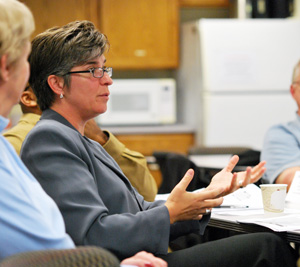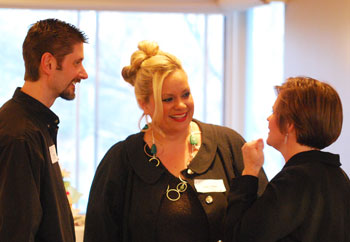A strategy for coordinating major funders of nonprofits in Washtenaw County has been in the works for more than a year, and is now being rolled out to governing boards for approval.

Mary Jo Callan, director of the Washtenaw County/city of Ann Arbor office of community development, described a proposed coordinated funding strategy by local governments, United Way of Washtenaw County and the Ann Arbor Area Community Foundation at the Sept. 28 meeting of the Washtenaw Urban County. (Photos by the writer.)
At Tuesday’s meeting of the Washtenaw Urban County executive committee, members were briefed on the proposal, which involves the Washtenaw United Way, Ann Arbor Area Community Foundation, Washtenaw County, city of Ann Arbor and the Urban County. Together, these entities provide about $5 million annually for local human services nonprofits.
Mary Jo Callan, director of the Washtenaw County/city of Ann Arbor office of community development, told Urban County members that the public/private model would focus funding on six priorities that have been identified for the entire county: housing/homelessness, aging, school-aged youth, children from birth to six, health and food.
The two-year pilot project is grounded in previous coordination between the city of Ann Arbor, Washtenaw County and the Urban County, a consortium of 11 local governments. The office of community development (OCD), which Callan leads, already manages nonprofit funding for those three entities.
Callan also said this could be a national model for communities that are trying to do a better job of delivering human services with constrained resources.
Some members of the Urban County executive committee, while expressing general support, also raised questions and concerns. How do individual nonprofit agencies fit into the funding model, especially if they don’t provide services in the areas identified as priorities? Will small or new nonprofits be able to compete successfully for funding, or will larger, well-established nonprofits have an overwhelming advantage? How well will the different cultures of United Way, the community foundation and local governments work together, and what roles will they play?
Callan acknowledged these challenges, but noted that many of these same concerns exist under the current, more fragmented funding model. Coordinated funding is the best approach to providing needed services to people in the county, she said.
The Urban County is expected to vote on the proposal at its Oct. 26 meeting. The other groups – including Ann Arbor’s city council – are expected to vote at meetings in late October and early November. Callan will also be making a presentation about the initiative to the county board of commissioners at their Oct. 7 working session. [Full Story]





